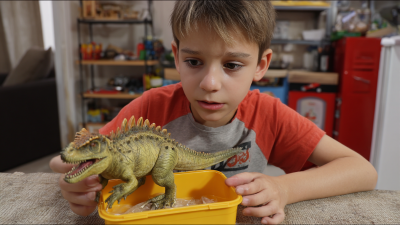Exploring the Benefits of Excavation Toys: How They Enhance STEM Learning in Young Children
Table of Contents
- The Role of Excavation Toys in Fostering Curiosity and Exploration
- Enhancing Problem-Solving Skills Through Hands-On Learning Experiences
- Promoting Collaborative Play and Social Interaction Among Peers
- Integrating STEM Concepts in a Fun and Engaging Way
- Encouraging Fine Motor Skills Development Through Excavation Activities
- FAQS
- Conclusion
- Related Posts
As the importance of early childhood education continues to gain recognition, educational toys such as Excavation Toys are emerging as valuable tools in STEM (Science, Technology, Engineering, and Mathematics) learning. According to a report by Research and Markets, the global educational toys market is projected to reach $95 billion by 2025, highlighting a growing interest in products that facilitate hands-on learning experiences.

Excavation Toys, in particular, engage young learners by promoting critical thinking, problem-solving, and fine motor skills through playful exploration. Since 2009, Jinhua City Dukoo Toys Co., Ltd. has specialized in crafting innovative archaeological toys that ignite curiosity and foster a love for learning among children worldwide. With nearly 13 years of experience and a factory that has expanded from 400 square meters to 8000 square meters, Dukoo Toys has established itself as a leader in the customization of archaeological products, aiming to support STEM education in a fun and interactive way.
The Role of Excavation Toys in Fostering Curiosity and Exploration
Excavation toys play a pivotal role in fostering curiosity and exploration among young children. These toys, which often mimic real-life excavation equipment, invite children to dig, discover, and learn about their environment in an engaging way. When children interact with these toys, they are naturally drawn to dismantle and explore, which reflects their innate desire to understand how things work. This aligns with the idea that curiosity is the starting point of exploration. Allowing children to investigate and manipulate these toys can enhance their problem-solving skills and critical thinking, essential components of STEM learning.
Moreover, when parents observe their children expressing interest in tearing apart toys rather than reprimanding them, they are nurturing a sense of inquiry. Emphasizing exploration over preservation can lead to significant developmental benefits. Through the process of excavation play, children learn to ask questions, experiment with solutions, and appreciate the joy of discovery. Ultimately, excavation toys serve as tools that not only captivate young minds but also lay the foundation for a lifelong love for learning and exploration in the fields of science, technology, engineering, and mathematics.
Exploring the Benefits of Excavation Toys in STEM Learning
This chart illustrates the various benefits of excavation toys in enhancing STEM learning for young children. The data indicates how these toys foster curiosity, improve problem-solving skills, and promote teamwork among children.
Enhancing Problem-Solving Skills Through Hands-On Learning Experiences
 Excavation toys serve as a fascinating resource for enhancing problem-solving skills in young children through hands-on learning experiences. By engaging with these toys, children are not just playing; they are exploring concepts of physics, engineering, and even mathematics in a playful and interactive manner. Through the act of digging, building, and reconstructing, children learn to manipulate their environment, make decisions, and understand the basic principles of cause and effect.
Excavation toys serve as a fascinating resource for enhancing problem-solving skills in young children through hands-on learning experiences. By engaging with these toys, children are not just playing; they are exploring concepts of physics, engineering, and even mathematics in a playful and interactive manner. Through the act of digging, building, and reconstructing, children learn to manipulate their environment, make decisions, and understand the basic principles of cause and effect.
Tips for parents looking to elevate their child's learning experience include encouraging open-ended play with excavation toys. Allow children the freedom to experiment without predefined instructions, which fosters creativity and critical thinking. Additionally, create opportunities for group play, as collaboration can lead to shared problem-solving experiences and the development of social skills.
Incorporating technology like augmented reality applications that complement these toys can further enhance the learning experience. These applications can provide additional context, visualizations, and challenges, making the problem-solving process even more engaging. By blending traditional play with innovative technology, children can enhance their STEM skills while enjoying the thrill of excavation activities.
Promoting Collaborative Play and Social Interaction Among Peers
Excavation toys are not only a source of entertainment for young children but also serve as a vital tool for promoting collaborative play and social interaction among peers. According to a report by the American Educational Research Association, interactive play scenarios significantly enhance peer relationships, fostering teamwork and communication skills. When children engage in collective excavation activities, they learn to share tools, encourage one another, and develop problem-solving strategies together, laying the foundation for effective social interaction.
At Jinhua City Dukoo Toys Co., Ltd., we recognize the importance of these cooperative learning experiences. Since our establishment in 2009, we have been dedicated to crafting archaeological toys that not only ignite a child’s curiosity but also promote group dynamics. Our products, tailored for diverse educational and developmental needs, help children immerse themselves in the learning process while building valuable social connections. Evidence from the National Association for the Education of Young Children supports that such collaborative play experiences can improve both cognitive and emotional development, which are crucial aspects of early childhood education.
Integrating STEM Concepts in a Fun and Engaging Way
Excavation toys serve as an exceptional tool for integrating STEM concepts into children's play. By encouraging hands-on interaction with concepts in science, technology, engineering, and math, these toys foster an engaging learning environment. For instance, while children dig and unearth buried treasures, they inadvertently grasp fundamental principles of physics, such as force and motion. This exploration allows them to experience the physical world directly, igniting their curiosity about how things work.
Moreover, excavation toys promote problem-solving skills by presenting challenges that require critical thinking. As children navigate the excavation process, they learn to strategize on how to dig efficiently, assess obstacles, and identify tools that will aid in their quest. This stimulating play not only enhances their cognitive abilities but also fosters teamwork when children collaborate on excavation projects. Through playful discovery, young learners are introduced to the core components of STEM, making the learning experience both fun and meaningful.
Exploring the Benefits of Excavation Toys: How They Enhance STEM Learning in Young Children
| Dimension | Description | Benefits | Age Group |
|---|---|---|---|
| Cognitive Skills | Development of problem-solving, critical thinking, and spatial awareness. | Enhanced logical reasoning and decision-making abilities. | 3-6 years |
| Motor Skills | Utilization of fine and gross motor skills through digging and manipulating toys. | Improved hand-eye coordination and physical dexterity. | 2-5 years |
| Scientific Inquiry | Encouragement of curiosity and exploration of materials and their properties. | Fostering a love for science and experimentation from an early age. | 4-7 years |
| Creativity | Opportunities for imaginative play and creative expression through building and storytelling. | Enhanced creativity and the ability to think outside the box. | 3-8 years |
| Social Skills | Encouragement of cooperative play and communication with peers. | Improved teamwork and social interaction abilities. | 3-7 years |
Encouraging Fine Motor Skills Development Through Excavation Activities
Excavation toys offer a dynamic way to engage young children in hands-on learning, particularly in developing fine motor skills. Through activities such as digging, scooping, and sifting, children expertly navigate various tools that refine their dexterity and hand-eye coordination. These actions not only enhance their physical abilities but also stimulate cognitive development, allowing them to think critically and problem-solve as they encounter different textures and materials during play.
Moreover, excavation activities encourage creativity and imagination. As children immerse themselves in pretend play scenarios, they become more adept at using their fingers and hands precisely, building strength and control in fine movements. This playful exploration fosters a sense of independence, as children often lead the way in their excavation adventures, deciding what to dig for and how to interact with their findings. The combination of movement and discovery creates a rich environment for learning, making excavation toys an essential tool in early childhood development focused on fine motor skill enhancement.

FAQS
: Excavation toys are designed to foster curiosity and exploration among young children by inviting them to dig, discover, and learn about their environment in an engaging way.
Excavation toys enhance problem-solving skills by allowing children to engage in hands-on learning experiences where they manipulate their environment, make decisions, and understand basic principles of cause and effect.
Parents can nurture a sense of inquiry by encouraging their children to explore and dismantle toys rather than reprimanding them, emphasizing exploration over preservation.
Open-ended play allows children the freedom to experiment without predefined instructions, which fosters creativity, critical thinking, and problem-solving skills.
Group play with excavation toys promotes collaborative play, enhancing peer relationships, teamwork, and communication skills as children learn to share tools and develop problem-solving strategies together.
Incorporating technology like augmented reality applications can enhance the learning experience by providing additional context, visualizations, and challenges that make the problem-solving process more engaging.
Evidence from the American Educational Research Association and the National Association for the Education of Young Children supports that interactive and collaborative play experiences can improve both cognitive and emotional development in young children.
Jinhua City Dukoo Toys Co., Ltd. has been crafting archaeological toys since its establishment in 2009.
The ultimate goal of using excavation toys in learning is to captivate young minds and lay the foundation for a lifelong love for learning and exploration in science, technology, engineering, and mathematics (STEM).
Excavation toys contribute to emotional development by providing children with opportunities to engage in cooperative learning experiences that help build valuable social connections.
Conclusion
Excavation Toys play a crucial role in fostering curiosity and exploration among young children, acting as a gateway to the world of STEM learning. Through hands-on experiences, these toys enhance problem-solving skills, inviting children to engage in activities that require critical thinking and creativity. Furthermore, Excavation Toys promote collaborative play and social interaction, enabling peers to work together, share ideas, and learn from one another in an interactive environment.
In addition to making learning fun and engaging, Excavation Toys help integrate essential STEM concepts, allowing children to grasp fundamental scientific principles while enjoying the thrill of discovery. These activities also encourage the development of fine motor skills, as children manipulate tools and artifacts during their archaeological adventures. Jinhua City Dukoo Toys Co., Ltd., with over a decade of expertise in creating customized archaeological toys, is dedicated to enhancing children's educational experiences worldwide through innovative and enjoyable Excavation Toys.
Related Posts
-

Creative Solutions for Enhancing Learning with Prehistoric Fossil Dig Toys
-

How to Unlock the Secrets of Fossil Discovery Toy for Young Explorers
-

Discover the Fascinating World of Gem Digging and Its Surprising Science
-

Exploring the Demand Surge for Christmas Archaeology Toys at the 2025 China Import and Export Fair
-

Uncovering Opportunities at the 2025 Canton Fair: Spotlight on Fossil Dig Kits for Educational Growth
-

How to Uncover Ancient Life with Amber Excavation Kits and Insect Preservation
Blog Tags:

